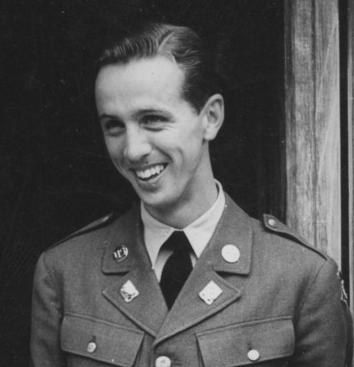With yesterday’s 65th Annivesary of the "D-Day" invasion of Normandy Beach, and President Obama’s visit two days ago to the site of the infamous concentration camp at Buchenwald, comes an outstanding memorial tribute to a father, as well as some compelling additional details.
Tom Cleary, a senior administrator at a San Diego-area University, provided me the following details and personally-penned article. I simply couldn’t pass it up. I don’t prefer to use the term lightly, but it’s a must read.
"With Obama’s visit Friday to Buchenwald and the stories being told about his great uncle," Cleary said, "I felt compelled to try and get the true story of Ohrdruf’s liberation out to anyone who might care about the facts. My late father was the first American officer to liberate the concentration camp at Ohrdruf, the first camp to be liberated by Americans. He was a first lieutenant with the 89th Division Recon Troop. He and his men found the camp and radioed for re-enforcements, which included Charlie Payne, Pres. Obama’s great uncle, who was in the 355th Infantry Regiment, Company K."
Remembering those who suffered and perished, honoring those who liberated
by Thomas Cleary
President Obama today visited the former concentration camp at Buchenwald, Germany. The president is to be applauded for making this visit to honor those who suffered and perished there, rather than practicing good politics as some have suggested. I pray that younger generations will take note of his actions, ask questions, read about the history involved, and talk to the dwindling numbers of witnesses who can still testify to these terrible events.
 My late father was the first American officer to discover the horrors inflicted on the victims of Nazi brutality. As a young lieutenant leading a recon platoon, he discovered the concentration camp near Ohrdruf, Germany on April 4, 1945. President Obama’s great uncle, Charlie Payne, was one of the many reinforcements who arrived at this camp several hours after my father and his men reported the dead, dying and few survivors who stumbled out from the surrounding woods to greet their liberators.
My late father was the first American officer to discover the horrors inflicted on the victims of Nazi brutality. As a young lieutenant leading a recon platoon, he discovered the concentration camp near Ohrdruf, Germany on April 4, 1945. President Obama’s great uncle, Charlie Payne, was one of the many reinforcements who arrived at this camp several hours after my father and his men reported the dead, dying and few survivors who stumbled out from the surrounding woods to greet their liberators.
Like many of his generation, my father tried not to dwell on the horrors he witnessed in combat and at camps like Ohrdruf, which was a subcamp of Buchenwald. He resisted discussing these memories, and even when I pressed him for information decades later, he was reluctant to talk about it, but he never forgot it. When my younger brother and I accompanied our parents on a business trip to Germany in the 1970s, my father made sure we visited the former concentration camp at Dachau, near Munich, which has been preserved as a memorial and museum.
The experience remains with me to this day. As an armchair historian who has studied the battles and politics of WWII for decades, nothing taught me quite as much as what I saw for myself. My father spoke very little that day at Dachau, but he really didn’t need to say anything. His insistence that my brother and I see that site said it all, and the message has never been forgotten.
Today, we might recognize my father’s behavior as part post-traumatic stress syndrome, which the military and the Veterans Administration has done a great deal to address, but still have a long way to go in treating. Still, the more my father tried not to discuss this chapter in his life, the more it prompted me to probe further and seek information on why the camp at Ohrdruf existed and why Jews, Russians, Poles and other slave laborers were worked to death by their German captors.
In a recent article from the German magazine Der Spiegel, Charlie Payne says that his famous nephew never asked him about Ohrdruf until after last year’s Memorial Day gaffe, when the presidential candidate confused Auschwitz with Ohrdruf. Afterwards, Barack Obama called his great uncle to learn more. The president is fortunate his great uncle is still alive and able to discuss those events and share the memories. It reaffirms George Santayana’s observation, “those who cannot remember the past are condemned to repeat it.” Let us not forget those who suffered and perished. Let us learn from history. Let us thank the liberators while they are still among us.
My father was laid to rest at Arlington National Cemetery last year with full military honors. Twenty-five members of my family were there. It was the proudest moment of my life.
###
The photo above was taken on Bob Cleary’s wedding day in 1942 when he was a sergeant. He received his commission the following year. Six months before his death, he and his wife celebrated their 65th wedding annivesary.
In 2002, the San Diego Union-Tribune published an article about Bob Cleary and his experiences at Ohrdruf. Read "Fateful steps into history" here.

